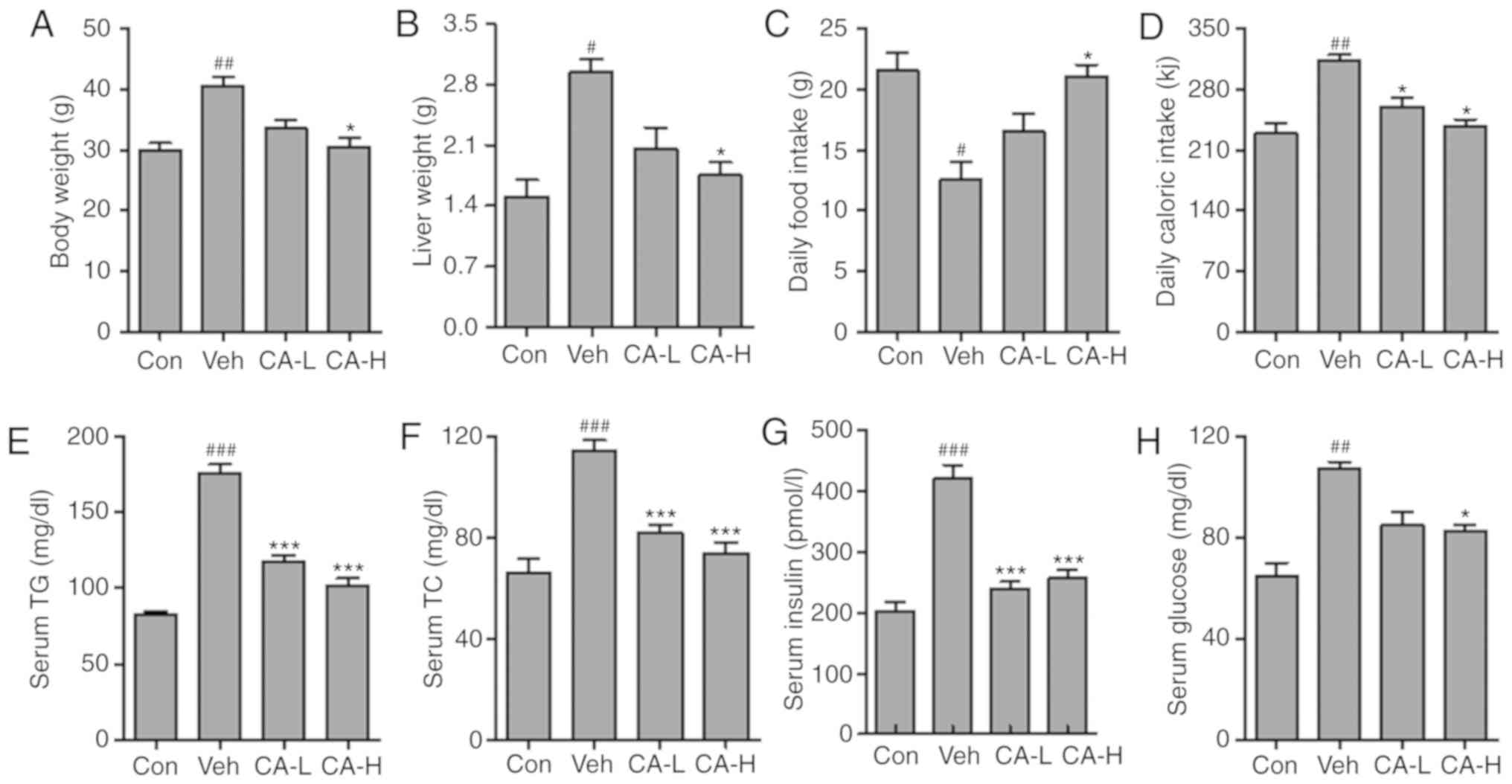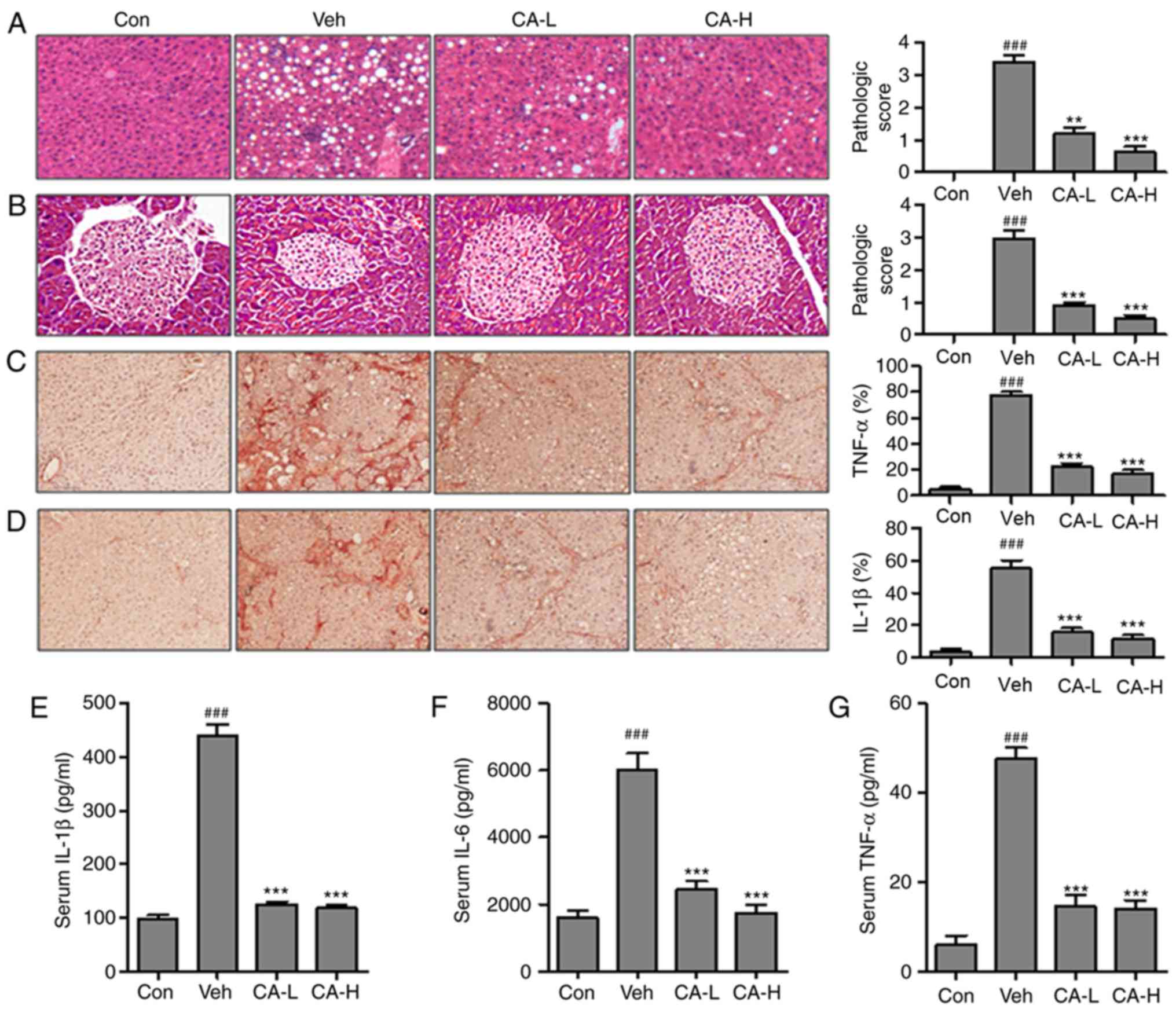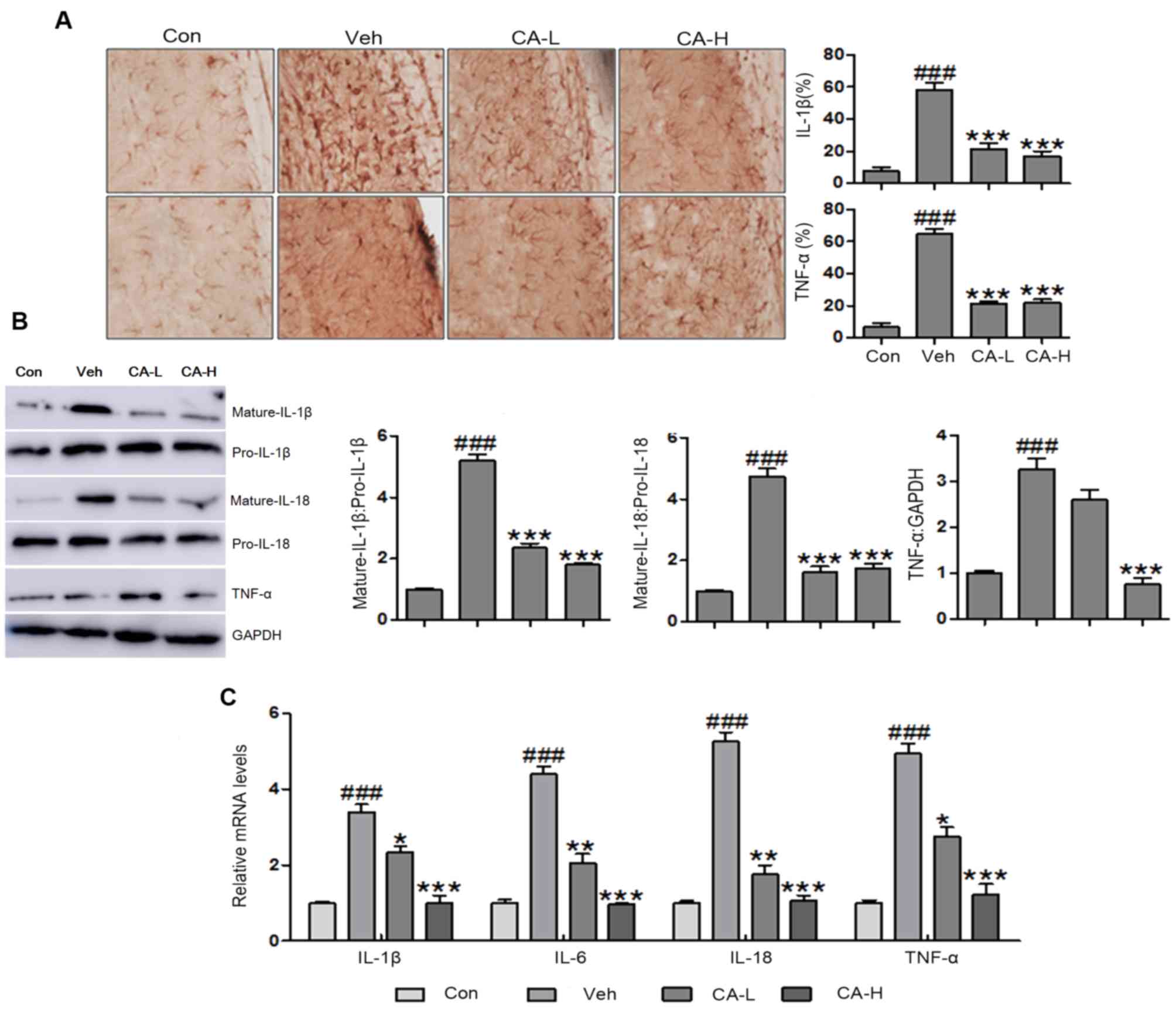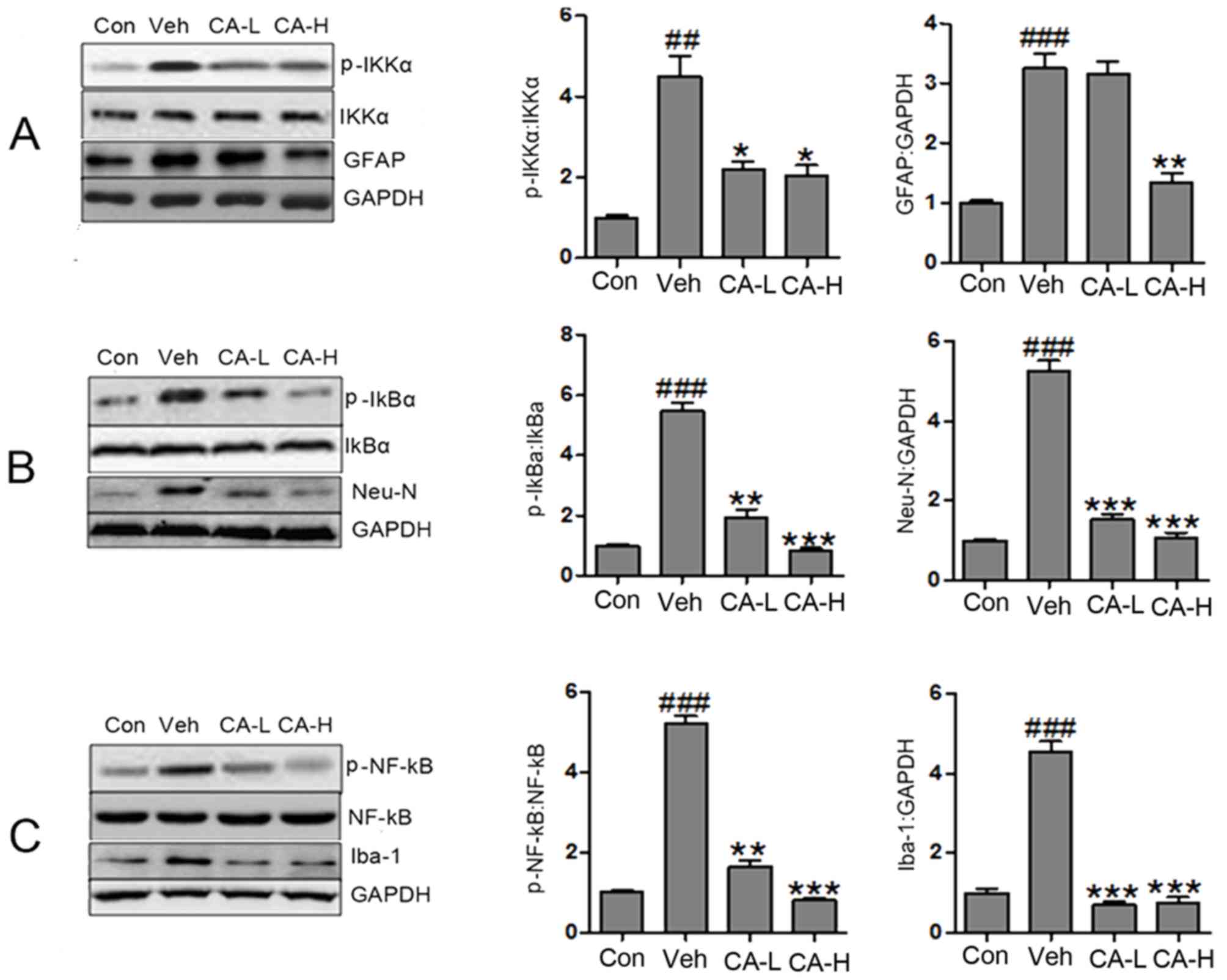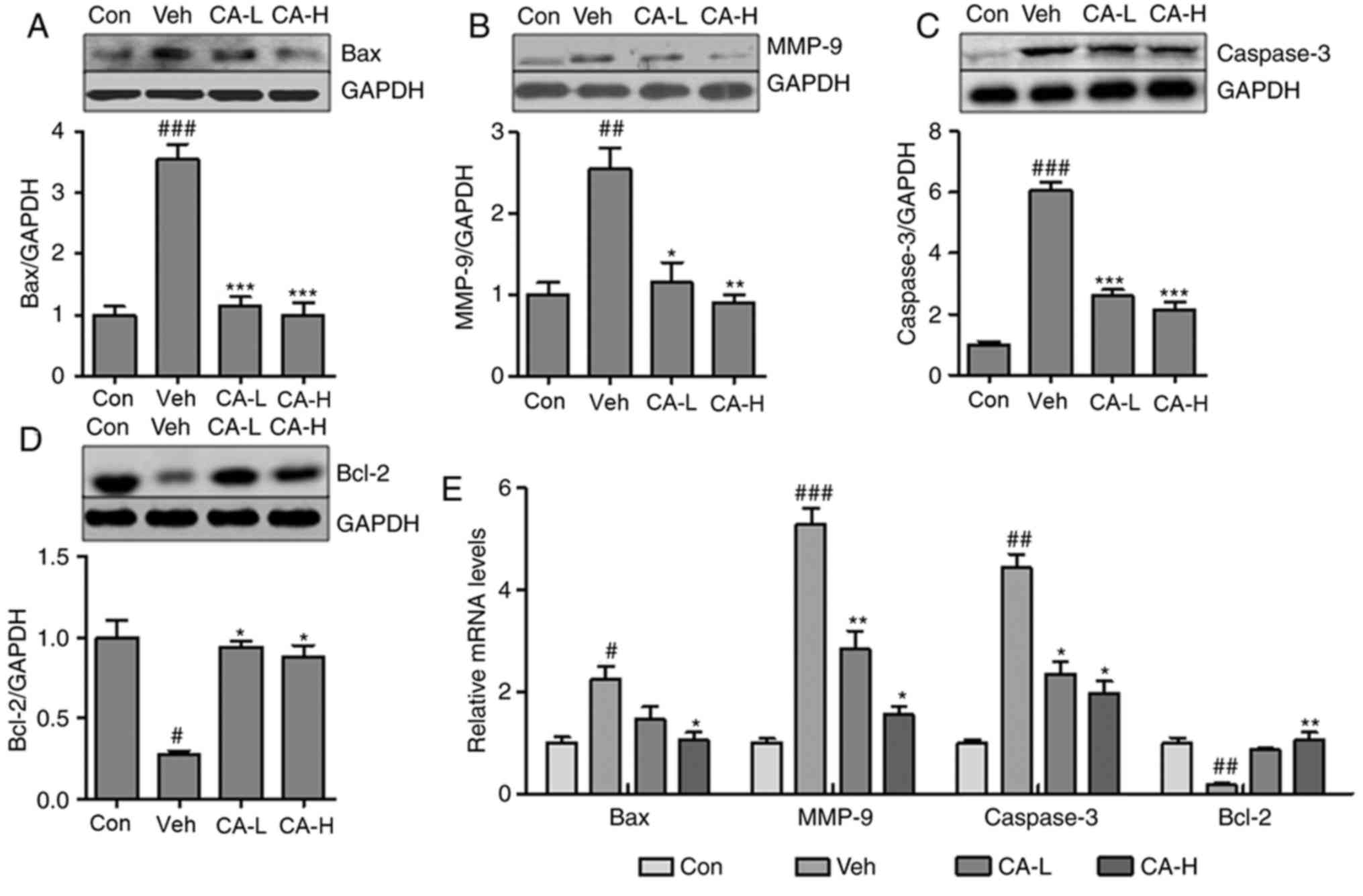|
1
|
Anandhan A, Essa MM and Manivasagam T:
Therapeutic attenuation of neuroinflammation and apoptosis by black
tea theaflavin in chronic MPTP/probenecid model of Parkinson's
disease. Neurotox Res. 23:166–173. 2013. View Article : Google Scholar : PubMed/NCBI
|
|
2
|
Barnum CJ and Tansey MG: Neuroinflammation
and non-motor symptoms: The dark passenger of Parkinson's disease?
Curr Neurol Neurosci Rep. 12:350–358. 2012. View Article : Google Scholar : PubMed/NCBI
|
|
3
|
Khan MM, Kempuraj D, Thangavel R and
Zaheer A: Protection of MPTP-induced neuroinflammation and
neurodegeneration by Pycnogenol. Neurochem Int. 62:379–388. 2013.
View Article : Google Scholar : PubMed/NCBI
|
|
4
|
Obermeier B, Verma A and Ransohoff RM: The
blood-brain barrier. Handb Clin Neurol. 133:39–59. 2016. View Article : Google Scholar : PubMed/NCBI
|
|
5
|
Fatima G, Das SK and Mahdi AA: Oxidative
stress and antioxidative parameters and metal ion content in
patients with fibromyalgia syndrome: Implications in the
pathogenesis of the disease. Clin Exp Rheumatol 31 (6 Suppl 79).
S128–S133. 2013.
|
|
6
|
Ghosh A, Kanthasamy A, Joseph J,
Anantharam V, Srivastava P, Dranka BP, Kalyanaraman B and
Kanthasamy AG: Anti-inflammatory and neuroprotective effects of an
orally active apocynin derivative in pre-clinical models of
Parkinson's disease. J Neuroinflammation. 9:2412012. View Article : Google Scholar : PubMed/NCBI
|
|
7
|
Yan J, Xu Y, Zhu C, Zhang L, Wu A, Yang Y,
Xiong Z, Deng C, Huang XF, Yenari MA, et al: Simvastatin prevents
dopaminergic neurodegeneration in experimental parkinsonian models:
The association with anti-inflammatory responses. PLoS One.
6:e209452011. View Article : Google Scholar : PubMed/NCBI
|
|
8
|
Chen WW, Zhang X and Huang WJ: Role of
neuroinflammation in neurodegenerative diseases (Review). Mol Med
Rep. 13:3391–3396. 2016. View Article : Google Scholar : PubMed/NCBI
|
|
9
|
Nizamutdinov D and Shapiro LA: Overview of
traumatic brain injury: An immunological context. Brain Sci.
7:E112017. View Article : Google Scholar : PubMed/NCBI
|
|
10
|
Mukandala G, Tynan R, Lanigan S and
O'Connor JJ: The effects of hypoxia and inflammation on synaptic
signaling in the CNS. Brain Sci. 6:E62016. View Article : Google Scholar : PubMed/NCBI
|
|
11
|
Ghosh A, Birngruber T, Sattler W, Kroath
T, Ratzer M, Sinner F and Pieber TR: Assessment of blood-brain
barrier function and the neuroinflammatory response in the rat
brain by using cerebral open flow microperfusion (cOFM). PLoS One.
9:e981432014. View Article : Google Scholar : PubMed/NCBI
|
|
12
|
Czabotar PE, Lessene G, Strasser A and
Adams JM: Control of apoptosis by the BCL-2 protein family:
Implications for physiology and therapy. Nat Rev Mol Cell Biol.
15:49–63. 2014. View
Article : Google Scholar : PubMed/NCBI
|
|
13
|
Koff JL, Ramachandiran S and
Bernal-Mizrachi L: A time to kill: Targeting apoptosis in cancer.
Int J Mol Sci. 16:2942–2955. 2015. View Article : Google Scholar : PubMed/NCBI
|
|
14
|
Rajan TS, Giacoppo S, Trubiani O, Diomede
F, Piattelli A, Bramanti P and Mazzon E: Conditioned medium of
periodontal ligament mesenchymal stem cells exert anti-inflammatory
effects in lipopolysaccharide-activated mouse motoneurons. Exp Cell
Res. 349:152–161. 2016. View Article : Google Scholar : PubMed/NCBI
|
|
15
|
Mengoni ES, Vichera G, Rigano LA,
Rodriguez Puebla ML, Galliano SR, Cafferata EE, Pivetta OH, Moreno
S and Vojnov AA: Suppression of COX-2, IL-1β and TNF-α expression
and leukocyte infiltration in inflamed skin by bioactive compounds
from Rosmarinus officinalis L. Fitoterapia. 8:414–421. 2011.
View Article : Google Scholar
|
|
16
|
Moore J, Yousef M and Tsiani E: Anticancer
effects of rosemary (Rosmarinus officinalis L.) extract and
rosemary extract polyphenols. Nutrients. 8:E7312016. View Article : Google Scholar : PubMed/NCBI
|
|
17
|
Jung KJ, Min KJ, Bae JH and Kwon TK:
Carnosic acid sensitized TRAIL-mediated apoptosis through
down-regulation of c-FLIP and Bcl-2 expression at the post
translational levels and CHOP-dependent up-regulation of DR5, Bim,
and PUMA expression in human carcinoma caki cells. Oncotarget.
6:1556–1568. 2015. View Article : Google Scholar : PubMed/NCBI
|
|
18
|
Tamaki Y, Tabuchi T, Takahashi T, Kosaka K
and Satoh T: Activated glutathione metabolism participates in
protective effects of carnosic acid against oxidative stress in
neuronal HT22 cells. Planta Medica. 76:683–688. 2010. View Article : Google Scholar : PubMed/NCBI
|
|
19
|
Tsai CW, Liu KL, Lin YR and Kuo WC: The
mechanisms of carnosic acid attenuates tumor necrosis
factor-α-mediated inflammation and insulin resistance in 3T3-L1
adipocytes. Mol Nutr Food Res. 58:654–664. 2014. View Article : Google Scholar : PubMed/NCBI
|
|
20
|
Oh J, Yu T, Choi SJ, Yang Y, Baek HS, An
SA, Kwon LK, Kim J, Rho HS, Shin SS, et al: Syk/Src
pathway-targeted inhibition of skin inflammatory responses by
carnosic acid. Mediators Inflamm. 2012:7813752012. View Article : Google Scholar : PubMed/NCBI
|
|
21
|
Meng P, Yoshida H, Matsumiya T, Imaizumi
T, Tanji K, Xing F, Hayakari R, Dempoya J, Tatsuta T,
Aizawa-Yashiro T, et al: Carnosic acid suppresses the production of
amyloid-β 1–42 by inducing the metalloprotease gene TACE/ADAM17 in
SH-SY5Y human neuroblastoma cells. Neurosci Res. 75:94–102. 2013.
View Article : Google Scholar : PubMed/NCBI
|
|
22
|
Chen JH, Ou HP, Lin CY, Lin FJ, Wu CR,
Chang SW and Tsai CW: Carnosic acid prevents
6-hydroxydopamine-induced cell death in SH-SY5Y cells via mediation
of glutathione synthesis. Chem Res Toxicol. 25:1893–1901. 2012.
View Article : Google Scholar : PubMed/NCBI
|
|
23
|
National Research Council (US) Committee
for the Update of the Guide for the Care, Use of Laboratory
Animals, . Guide for the Care and Use of Laboratory Animals. 8th.
National Academies Press (US); Washington, DC: 2011
|
|
24
|
Zhao Y, Sedighi R, Wang P, Chen H, Zhu Y
and Sang S: Carnosic acid as a major bioactive component in
rosemary extract ameliorates high-fat-diet-induced obesity and
metabolic syndrome in mice. J Agric Food Chem. 63:4843–4852. 2015.
View Article : Google Scholar : PubMed/NCBI
|
|
25
|
Alberti KG and Zimmet PZ: Definition,
diagnosis and classification of diabetes mellitus and its
complications. Part 1: Diagnosis and classification of diabetes
mellitus provisional report of a WHO consultation. Diabet Med.
15:539–553. 1998. View Article : Google Scholar : PubMed/NCBI
|
|
26
|
Chan JK: The wonderful colors of the
hematoxylin-eosin stain in diagnostic surgical pathology. Int J
Surg Pathol. 22:12–32. 2014. View Article : Google Scholar : PubMed/NCBI
|
|
27
|
Gouze E, Pawliuk R, Gouze JN, Pilapil C,
Fleet C, Palmer GD, Evans CH, Leboulch P and Ghivizzani SC:
Lentiviral-mediated gene delivery to synovium: Potent
intra-articular expression with amplification by inflammation. Mol
Ther. 7:460–466. 2003. View Article : Google Scholar : PubMed/NCBI
|
|
28
|
Kramer AS, Latham B, Diepeveen LA, Mou L,
Laurent GJ, Elsegood C, Ochoa-Callejero L and Yeoh GC: InForm
software: A semi-automated research tool to identify presumptive
human hepatic progenitor cells, and other histological features of
pathological significance. Sci Rep. 8:34182018. View Article : Google Scholar : PubMed/NCBI
|
|
29
|
Livak KJ and Schmittgen TD: Analysis of
relative gene expression data using real-time quantitative PCR and
the 2(-Delta Delta C(T)) method. Methods. 25:402–408. 2001.
View Article : Google Scholar : PubMed/NCBI
|
|
30
|
Yu W, Wu J, Cai F, Xiang J, Zha W, Fan D,
Guo S, Ming Z and Liu C: Curcumin alleviates diabetic
cardiomyopathy in experimental diabetic rats. PLoS One.
7:e5201320122012. View Article : Google Scholar
|
|
31
|
Klöting N and Blüher M: Adipocyte
dysfunction, inflammation and metabolic syndrome. Rev Nedcor Metab
Disord. 15:277–287. 2014. View Article : Google Scholar
|
|
32
|
Pozniak PD, White MK and Khalili K:
TNF-α/NF-κB signaling in the CNS: Possible connection to EPHB2. J
Neuroimmune Pharmacol. 9:133–141. 2014. View Article : Google Scholar : PubMed/NCBI
|
|
33
|
Ricci G, Pirillo I, Tomassoni D, Sirignano
A and Grappasonni I: Metabolic syndrome, hypertension, and nervous
system injury: Epidemiological correlates. Clin Exp Hypertens.
39:8–16. 2017. View Article : Google Scholar : PubMed/NCBI
|
|
34
|
Wan F and Lenardo MJ: The nuclear
signaling of NF-kappaB: Current knowledge, new insights, and future
perspectives. Cell Res. 20:24–33. 2010. View Article : Google Scholar : PubMed/NCBI
|
|
35
|
Bramanti V, Tomassoni D, Avitabile M,
Amenta F and Avola R: Biomarkers of glial cell proliferation and
differentiation in culture. Front Biosci (Schol Ed). 2:558–570.
2010.PubMed/NCBI
|
|
36
|
Shalini S, Dorstyn L, Dawar S and Kumar S:
Old, new and emerging functions of caspases. Cell Death Differ.
22:526–539. 2015. View Article : Google Scholar : PubMed/NCBI
|
|
37
|
D'Amelio M, Sheng M and Cecconi F:
Caspase-3 in the central nervous system: Beyond apoptosis. Trends
Neurosci. 35:700–709. 2012. View Article : Google Scholar : PubMed/NCBI
|
|
38
|
Kaur J: A comprehensive review on
metabolic syndrome. Cardiol Res Pract. 2014:9431622014. View Article : Google Scholar : PubMed/NCBI
|
|
39
|
Bartzokis G: Alzheimer's disease as
homeostatic responses to age-related myelin breakdown. Neurobiol
Aging. 32:1341–1371. 2011. View Article : Google Scholar : PubMed/NCBI
|
|
40
|
He Q, Liu J, Liang J, Liu X, Li W, Liu Z,
Ding Z and Tuo D: Towards improvements for penetrating the
blood-brain barrier-recent progress from a material and
pharmaceutical perspective. Cells. 7:E242018. View Article : Google Scholar : PubMed/NCBI
|
|
41
|
Barni MV, Carlini MJ, Cafferata EG,
Puricelli L and Moreno S: Carnosic acid inhibits the proliferation
and migration capacity of human colorectal cancer cells. Oncol Rep.
27:1041–1048. 2012. View Article : Google Scholar : PubMed/NCBI
|
|
42
|
Pesakhov S, Khanin M, Studzinski GP and
Danilenko M: Distinct combinatorial effects of the plant
polyphenols curcumin, carnosic acid, and silibinin on proliferation
and apoptosis in acute myeloid leukemia cells. Nutr Cancer.
62:811–824. 2010. View Article : Google Scholar : PubMed/NCBI
|
|
43
|
Park M, Han J, Lee CS, Soo BH, Lim KM and
Ha H: Carnosic acid, a phenolic diterpene from rosemary, prevents
UV-induced expression of matrix metalloproteinases in human skin
fibroblasts and keratinocytes. Exp Dermatol. 22:336–341. 2013.
View Article : Google Scholar : PubMed/NCBI
|
|
44
|
Maynard ME, Underwood EL, Redell JB, Zhao
J, Kobori N, Hood KN, Moore AN and Dash PK: Carnosic acid improves
outcome after repetitive mild traumatic brain injury. J
Neurotrauma. Mar 26–2019.(Epub ahead of print). View Article : Google Scholar : PubMed/NCBI
|
|
45
|
Lee YS, Cha BY, Saito K, Choi SS, Wang XX,
Choi BK, Yonezawa T, Teruya T, Nagai K and Woo JT: Effects of a
Citrus depressa Hayata (shiikuwavsa) extract on obesity in high-fat
diet-induced obese mice. Phytomedicine. 18:648–654. 2011.
View Article : Google Scholar : PubMed/NCBI
|
|
46
|
Karelina K and Weil ZM: Neuroenergetics of
traumatic brain injury. Concussion. 1:CNC92015.PubMed/NCBI
|
|
47
|
Cao C, Zhu Y, Chen W, Li L, Qi Y, Wang X,
Zhao Y, Wan X and Chen X: IKKε knockout prevents high fat diet
induced arterial atherosclerosis and NF-κB signaling in mice. PLoS
One. 8:e649302013. View Article : Google Scholar : PubMed/NCBI
|
|
48
|
Verhelst K, Verstrepen L, Carpentier I and
Beyaert R: IκB kinase ε (IKKε): A therapeutic target in
inflammation and cancer. Biochem Pharmacol. 85:873–880. 2013.
View Article : Google Scholar : PubMed/NCBI
|
|
49
|
Liu T, Zhang L, Joo D and Sun SC: NF-κB
signaling in inflammation. Signal Transduct Target Ther.
2:170232017. View Article : Google Scholar : PubMed/NCBI
|
|
50
|
Simpson JE, Ince PG, Lace G, Forster G,
Shaw PJ, Matthews F, Savva G, Brayne C and Wharton SB; MRC
Cognitive Function and Ageing Neuropathology Study Group, :
Astrocyte phenotype in relation to Alzheimer-type pathology in the
ageing brain. Neurobiol Aging. 31:578–590. 2010. View Article : Google Scholar : PubMed/NCBI
|
|
51
|
Tremblay MÈ, Zettel ML, Ison JR, Allen PD
and Majewska AK: Effects of aging and sensory loss on glial cells
in mouse visual and auditory cortices. Glia. 60:541–558. 2012.
View Article : Google Scholar : PubMed/NCBI
|
|
52
|
Lyck L, Dalmau I, Chemnitz J, Finsen B and
Schrøder HD: Immunohistochemical markers for quantitative studies
of neurons and glia in human neocortex. J Histochem Cytochem.
56:201–221. 2008. View Article : Google Scholar : PubMed/NCBI
|
|
53
|
Zlatic S, Comstra HS, Gokhale A, Petris MJ
and Faundez V: Molecular basis of neurodegeneration and
neurodevelopmental defects in Menkes disease. Neurobiol Dis.
81:154–161. 2015. View Article : Google Scholar : PubMed/NCBI
|
|
54
|
Simon DJ, Weimer RM, McLaughlin T, Kallop
D, Stanger K, Yang J, O'Leary DD, Hannoush RN and Tessier-Lavigne
M: A caspase cascade regulating developmental axon degeneration. J
Neurosci. 32:17540–17553. 2012. View Article : Google Scholar : PubMed/NCBI
|
|
55
|
Olsson M and Zhivotovsky B: Caspases and
cancer. Cell Death Differ. 18:1441–1449. 2011. View Article : Google Scholar : PubMed/NCBI
|















